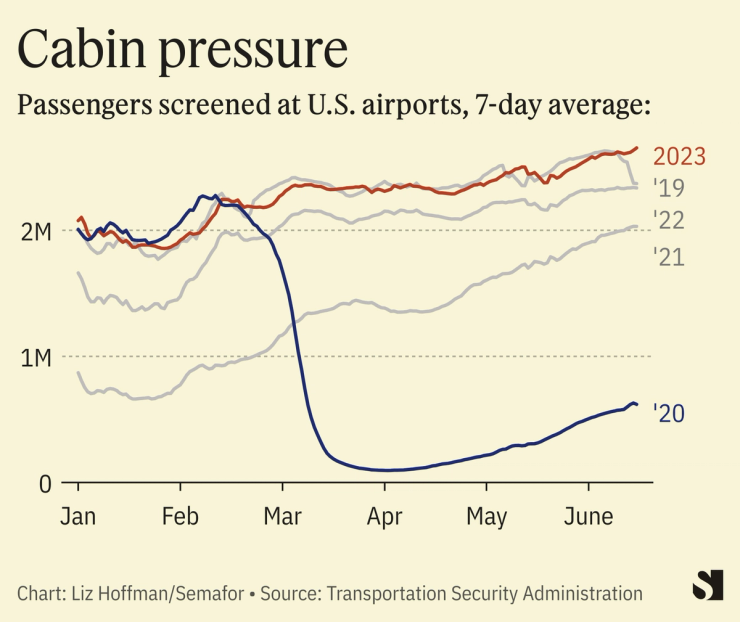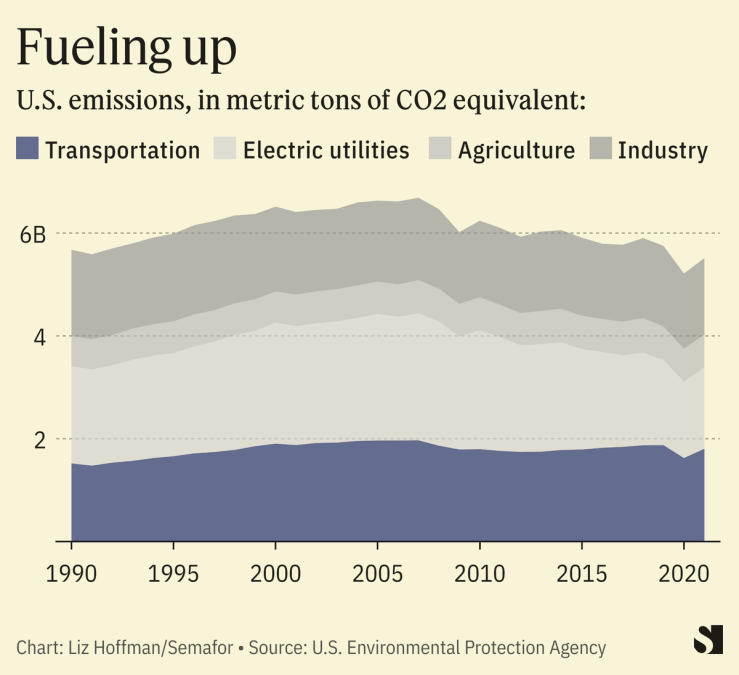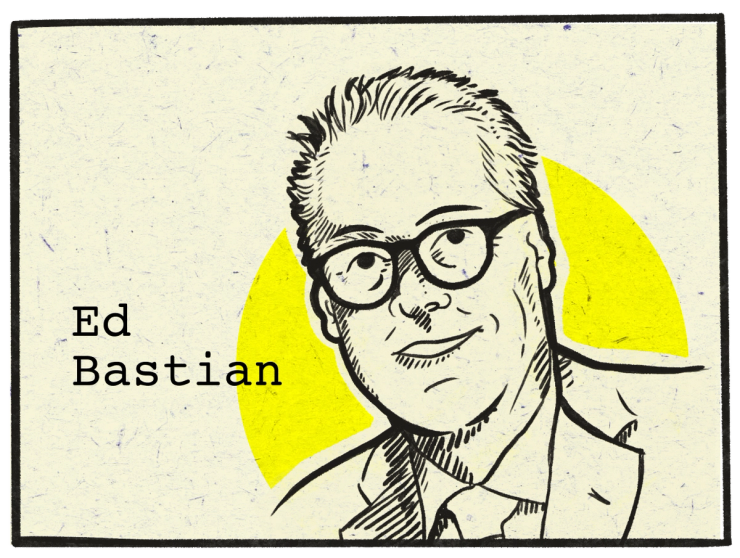Semafor Business’s new signature interview series, On The Record, will bring you conversations with the people running, shaping, and changing our economy.
Ed Bastian’s plane is late. This one isn’t Delta’s fault — it’s pouring rain in New York, and air traffic at LaGuardia, where I’d arranged to meet the airline’s CEO in the gleaming, airy terminal that his company spent $4 billion rebuilding during the pandemic quiet, is backed up.
He’s also slow getting off the plane, which I take as evidence that he was flying coach, as he often does. He wasn’t this time, he tells me when he sits down at the Trattoria Sunday Supper next to gate 73 in Terminal C and orders a Diet Coke. But during the flight from Delta’s home in Atlanta, word had spread that he was on board. As the face of Delta’s preflight video, he’s more recognizable than your average CEO, and he’d indulged selfie-seekers on the jetway.
We talked about the summer-winter-summer of travel hell; bailouts; how to pay for carbon-free jet fuel; his advice for CEOs stepping into culture wars; and why airplane Wi-Fi sucks, over the course of an hour, before he headed out for a dinner with investors. Late arrival, but an on-time departure.
This interview was condensed and edited for clarity.
Liz: Air travel is a mess, again. Why does this keep happening?
Ed: Demand has been off the charts. After the pandemic, people just wanted to go someplace. They didn’t care where they were going, how much they were paying, they just wanted to get out.
It was hard enough just replacing the employees who had left or retired. We’ve hired 25,000 people in the last year. The technical complexity of these jobs is significant. You can’t just hire people off the street and put them to work on the ramp or fixing planes or sorting out technology.

The industry got billions in aid during the pandemic. Some people have called it a bailout, and one that cost an awful lot per job saved. What’s your response?
The money the government gave us went to our people. It didn’t go to bail out shareholders. Thirty percent of it we’re paying back in the form of loans. And by keeping those employees in the industry engaged, not only did it set us up for a rapid recovery, but remember we had an obligation to keep the airways open. People needed to be on the frontlines of the crisis — doctors, people whose family members were sick, supply chain workers.
If we didn’t have the support from the White House, you and I would not be sitting here in a brand new LaGuardia Airport. This project would have been years in the making. We had the capital to invest, and because it was so empty, we were able to shave years off this project and billions off the cost. LAX, too. Salt Lake City. And Seattle, where we’ve opened a new international terminal.
I’ve seen the impact in other countries around the world where governments didn’t step in. The European airports did not keep their employees and you had lines going for miles, a sea of lost bags. That was a glimpse of what might have happened here. [Note: Read our deep dive into the airline rescue: what it cost, and what we got for it.]
It’s 2023. Why don’t we have Wi-Fi on every flight?
We’ve been rolling out free Wi-Fi on our domestic flights this year. Coming to international next year. And candidly if it wasn’t for the pandemic, we’d probably still be a couple years out. We took advantage of having a lot of planes on the ground to change out the equipment.
We’ve spent over a billion dollars in the last three years to create this. The only thing we ask is that you become a member of our SkyMiles program, which doesn’t cost anything to join.
Because SkyMiles members are better customers?
Of course they are. And they’re younger. The average age of a SkyMiles member today is 38. The average age of [those who joined the program this year] is 32. These are people that don’t have loyalty to a single airline yet. So we’re building generational loyalty.
With Wi-Fi.
With Wi-Fi.
There’s a revenue component for you too, right?
We have 200 million customers a year, 50 million unique. We have them, on average, for three hours at a time. They’re seatbelted in. They’re all looking straight ahead. And they’re bored.
Our partners — Paramount+, T-Mobile, American Express — are paying us a meaningful amount to gain exclusive access to these customers. We have to pay for [traditional] inflight content, and here they’re paying us. We’ll have more lanes, too. There will be a shopping lane.
In 2020, you were talking about futuristic tech like biometric screens and bionic baggage handlers. Then came the pandemic, and all those things seemed a bit ridiculous. Are you back to that kind of ambition?
They did, and we paused some of them. But the biometric board, where you look at it and it gives you your itinerary, is up and running in Detroit.
JetBlue is going to court to defend its takeover of Spirit. Is there enough competition in the airline industry?
We’re a hugely competitive industry. And we’re increasingly competing around service quality, which is another thing the pandemic brought to the forefront.
The pundits all thought that Delta was going to get crushed because we cater to a higher tier of customers. They said the only people who are going to fly are the most price-sensitive, and so the low-cost airlines are going to have a bonanza at our expense. And just the opposite happened. The low cost carriers have gotten into a world of trouble.
And you see that through the economy. The premium sector, through goods and services and experiences, has been on fire. People are investing in themselves rather than price.
Labor is having a moment. Delta is less unionized than other airlines — and has actively fought organizing efforts — but you recently gave your unionized pilots a big pay bump that American matched.
Well, they’re saying they’re going to match. That’s going to be a long slog.
OK. But broadly this tug of war between management and labor coming out of the pandemic … it feels like labor is winning.
The pilots are unique. Our contract was essentially frozen for four years. And so while the headline number is large, those rates hadn’t changed in four years, and this contract runs for another four years. If you look at it over an eight year span, it’s not nearly as expensive. But we want to have the best of the best.
With respect to our other employees, we have the best profit-sharing arrangement in the industry, and we’re the most profitable. We paid $550 million [in February], more than all the other airlines put together.
Lot of CEOs are getting caught up in culture-war issues. You were an early combatant there. Any advice?
Be cautious. The pressure internally to respond in the moment is great. And you don’t want to be so cautious that you are seen to have been a late follower. But being a pioneer in this space is a lonely place to be.
Both times that I did that — first with the NRA, and then the Georgia voting rights bill — were for issues that had unique application to our company. Yes, they had broader societal [implications], but they mattered to our employees.
You’ve set a goal to be carbon neutral by 2050. How do you do that without just passing costs on to customers who may or may not share your priorities?
It’s an existential risk to our business if we don’t make good progress on that. Flight-shaming in Europe is crazy. But we have a real opportunity here. We can operate an engine on biofuel today, but it costs three to five times what we pay for jet fuel. The aviation sector can’t afford that; we just don’t have the capital. And our shareholders can’t be guinea pigs.

It’s going to take private capital willing to invest, but that’s a long, slow pathway. As far away as [2050] feels, candidly, it feels even further away from our actual ability to achieve it if we don’t start attracting capital in the sector.
This is where government can step in with proper incentives — not mandates, incentives. Energy companies that want to invest in research need to know that we can afford to take the product that they’re investing in.
Three years after Covid arrived, where’s business travel?
About 80% back. But there’s a big caveat: New work patterns mean that people are traveling who in the past couldn’t because they were in an office Monday through Friday. When I talk to CEOs and they moan about how they’re having a hard time getting their employees in, I say: ‘I know where they are. They’re on my airplanes.’
What was your first job?
I worked on a highway when I was 16, repairing potholes and putting asphalt down.
Is it true you didn’t get on a plane until you were 25?
Yes.
What’s the last professional problem you had and who did you ask for advice?
I have two close friends who are pastors — business issues are personal issues, we just call them something else. They’re all decisions you have to take. And I reach out regularly to [former Delta CEO] Jerry Grinstein. I went out to see him last year at his 90th birthday party.
A business prediction for this year that is not about your company?
Our economy is going to do much better than the prevailing pessimism.

